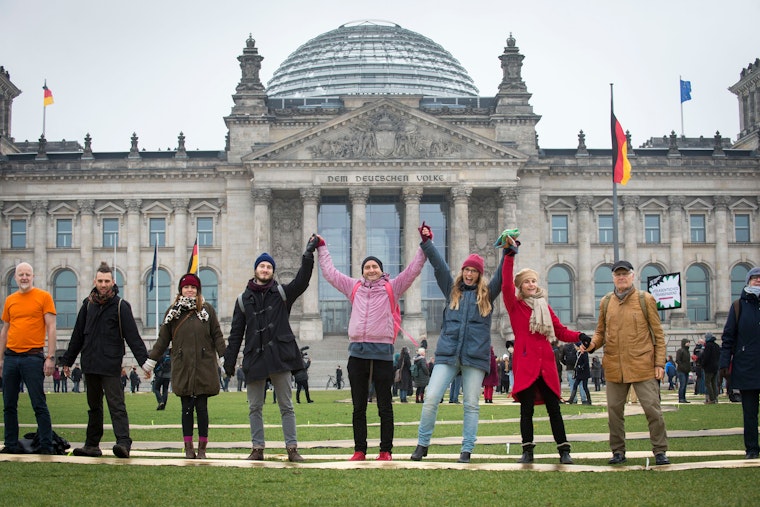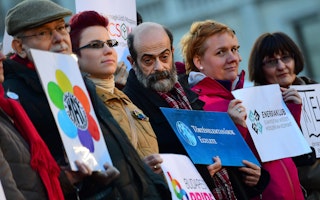Elections Alone Are Not Enough: Could Citizens’ Assemblies Save Democracy in Germany?
By Finn Heinrich

The parliamentary election campaign in Germany is entering its crucial phase. Many people hope that more focus will finally be given to the real issues—such as climate protection, tax policy, social justice, and public infrastructure. If you watch the recent campaign debates and listen to the audiences’ questions, you will see discussions about red socks, gender stereotypes, and other heated arguments of minor importance. The public’s very real everyday concerns are often overlooked in the political debate.
As a result, it is no surprise that the campaign is not reaching many voters, and that their trust in democracy is waning. We already know from research on democracy that many people are dissatisfied with it, largely because they do not feel they have any influence on political decisions. Half of Germans feel that they are not represented by our political system, according to a survey by More in Common. These people are not interested in the election campaign, as they see few opportunities for meaningful participation beyond going to the polls every four years, and democratic issues do not feature at all in the conversation. Debates on innovation or changes in democracy are nonexistent.
On the whole, German democracy still operates with the same institutions and the same processes as it did when it was first established more than 70 years ago. Since then, however, social reality has radically changed: thanks to the expansion of education, new information and communication media, and the modernization of the living and working environment, German citizens in 2021 have many more resources, capabilities, and interest in participating in political life. So far, however, the political system has not responded to this widespread desire for more involvement.
So how do we unlock this untapped democratic potential? There are plenty of problems that can be addressed and solved most effectively through widespread and deep participation processes: from the consequences of the coronavirus crisis and the issue of how we want to use or limit artificial intelligence, to the century-long task of managing the upcoming transformation to a social-ecological market economy.
Citizens’ assemblies are a useful form of participation where a randomly and representatively selected number of people closely collaborate with experts over a period of several months on a political issue and draw up recommendations for policymakers.
This may sound like a theoretical pipe dream, but it is not that crazy. Many countries are proving that it can be done. Take Ireland, for example, where a citizens’ assembly paved the way for a referendum on marriage equality. In France, a government-appointed assembly developed specific proposals for adhering to the Paris climate agreement, and a assembly of citizens established a program to combat hate on the internet in Canada. These few examples show that participation is the trend. The Organization for Economic Co-operation and Development (OECD), a global body that collects data on deliberative practices, speaks of a genuine “deliberative wave.”
These new processes are, of course, accompanied by challenges. How can the most realistic representation of society be achieved? How are the experts who advise citizens selected? How can we guarantee that the recommendations really feed into the political process? These questions need to be answered. It is worth the effort, because we can already see that experts in democracy learn from every citizens’ assembly that is held and that “best practice” standards have now been defined. One such standard was set in the German-speaking region of Belgium, with Eupen as its capital. In Eupen, citizens’ assemblies are even embedded in the democratic system as an independent chamber. This gives inclusive assemblies a legal basis for use in the long term and can thereby enhance and strengthen the basic model of representative democracy.
What could democratic innovation in Germany possibly look like? A permanent citizens’ assembly, as in Eupen, is not currently on the agenda. But a legal establishment of citizens’ assemblies, in order to be able to set them up for specific issues, would be an important next step. The Federal Parliament and its administration already have had good experience with this model through the Citizens’ Assembly on Germany’s Role in the World at the beginning of the year. The recently concluded climate citizens’ assembly was well-received by the media and politicians. On a local level, there has been an explosion of citizens’ assemblies and other forms of participation for some time. A survey showed that more than three quarters of Germans viewed such assemblies in a positive light. Finally, more and more former participants in these assemblies have decided to become active in politics to campaign for new forms of participation.
This is why the Mehr Demokratie association has launched a wide-ranging campaign to incorporate citizens’ assemblies into our democracy. We at the Open Society Foundations support their effort. The issue of democratic reform should be carried into the German election campaign, and into as many constituencies as possible, in order to win over the respective candidates to this reform.
One might think that democracy campaigners everywhere are preaching to the choir. After all, all the parties that respect the constitution call for the strengthening of democracy in Germany. But will the political rhetoric be followed by concrete pledges and steps—for example, a commitment to more participation opportunities in the coalition agreement to form a government after the election? We have innumerable examples that show that more participation can work, and that it can counteract disillusionment with politics and division in our society. We now need the courage and political will to change and expand our democracy—so that it can survive.

Finn Heinrich is a division director for Open Society–Europe and Central Asia.


